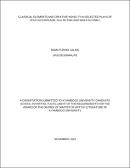| dc.description.abstract | This study analyzed classical elements and creative novelty in selected plays of Efua Sutherland, Ola Rotimi and Wole Soyinka through a cross-reference to the selected drama of Euripides and Sophocles. The study was guided by three objectives, namely: the underlying classical themes and ideas, literary style and creative novelty in the selected plays. The study was library-based, involving a close reading and analysis of both primary and secondary sources of data through which classical elements and creative in the selected African drama was explained. The primary sources of data were three African plays, Efua Sutherland’s Edufa, Ola Rotimi’s The Gods Are Not to Blame and Wole Soyinka’s The Bacchae of Euripides: A Communion Rite. Secondary sources were got from book-reviews, articles, reports and journals, and this was supplemented by a close reading of three classical drama texts, namely Euripides’ Alcestis, The Bacchae and Sophocles’ King Oedipus. The New Historicism literary theory and central notions of intertextuality were used to critically analyse classical themes and ideas, the classical literary style adapted, and the authors’ creative novelty. The analyzed data was then organized into five chapters. The findings of the study reveal the influence of classical theories in the construction and production of the drama of Efua Sutherland, Ola Rotimi and Wole Soyinka. The classical themes include: fate versus freewill, sin and retribution, patriarchy, subjugation of women and misogyny, human suffering and the folly of pride. The classical literary style adapted include: use of the prologue, plot structure and characterization; the creative novelty includes changes in titles, characterization, Africanized themes and use of elements from the African oral tradition. The study recommends that future literary scholars should investigate the role of classical literature in promoting imperialistic agenda in Africa. | en_US |

